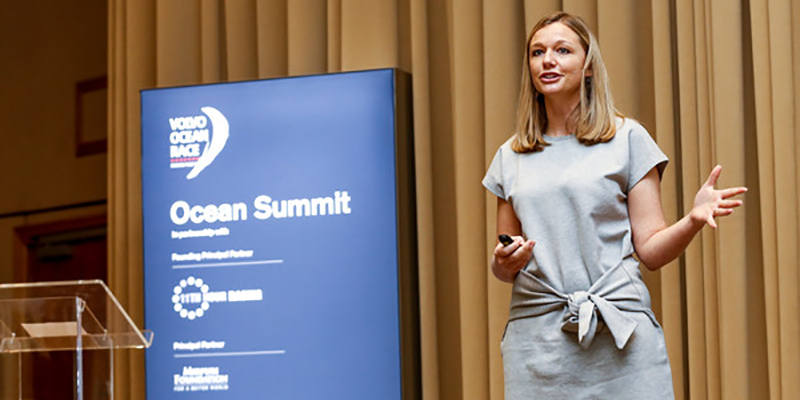
Ocean Summit – Cape Town
As the sailing teams busily prepared for the in-port race and leg start – sailors, race partners, ocean leaders and local environmental NGOs gathered for a two-day Ocean Summit at the V & A Waterfront, home to the Volvo Ocean Race village in Cape Town. Here’s a selection of highlights from the day!
Plastic Pollution & Creative Solutions
The audience embraced the theme of plastic pollution and creative solutions, and it was inspiring to see a variety of ideas to move towards the circular economy and zero waste initiatives.
The Summit kicked off with help from sailors sharing what they see out at sea. Charlie Enright and Dee Caffari represented the sailors of the Volvo Ocean Race – sharing how their teams are raising awareness for ocean health, implementing solutions and promoting the #CleanSeas pledge.
 Photo credit: Pedro Martinez/ Volvo Ocean Race
Photo credit: Pedro Martinez/ Volvo Ocean Race
Emily Penn, the founder of an 11th Hour Racing grantee, eXXpedition, is a sailor and passionate advocate on educating women and the general public about the impact plastic pollution is having on our environment and our health. She shared her personal story of having her blood tested to see how many chemicals that are banned by the United Nations were in her body. Of the 35 chemicals tested for – 29 of them were found in her blood.
Volvo Ocean Race Science Program – Onboard Monitoring Success
Dr. Toste Tanhua, Senior Scientist in Chemical Oceanography at GEOMAR revealed early information gathered during the Prologue stage and Leg 1 of the Volvo Ocean Race from the scientific observation equipment on board the race boats, including a new system that can collect data on microplastics. Since the boats will go to some of the most remote places on earth, scientists will have a new baseline data set of how far spread these tiny pieces of microplastic are around the world.
 Photo credit: Pedro Martinez/ Volvo Ocean Race
Photo credit: Pedro Martinez/ Volvo Ocean Race
Success in the Business Sector
Local engagement and tangible commitment were highlighted as the CEO of V & A Waterfront, David Green announced the intention of banning plastic bags and bottles! Next up was Brian Brauer from Algramo, a recent winner of the New Plastics Economy Innovation Prize. The company, based in Chile, has created a vending machine-like system that solves two problems at once. The machines offer affordable quantities of everyday products without single-use, non-recyclable packaging. The issue of access and availability of clean water – which is very relevant to Cape Town’s dramatic drought – was addressed by Anders Jacobson, CEO of Bluewater, a Swedish company that produces an innovative water filtration system the size of a desktop computer tower that can turn non-potable water and even brackish water into pure, clean drinking water. Jacobson shared his vision for providing safe, trusted drinking water around the world and how the company, along with 11th Hour Racing and the Volvo Ocean Race were proving water throughout the Race Village from polluted spring water. Bluewater announced their commitment to leave at least one of their water units in Cape Town as a tangible legacy.
 Photo credit: Pedro Martinez/ Volvo Ocean Race
Photo credit: Pedro Martinez/ Volvo Ocean Race
Local Solutions
The second day of the Ocean Summit focused on entrepreneurs and NGOs in South Africa that have successfully implemented an innovative way to tackle plastic pollution. One highlight was The Eco-Brick Exchange, low cost, thermally insulating bricks that are made by merely compressing unrecyclable plastics into two-liters plastic bottles. The organization focuses on building schools and garden projects – while providing jobs in low-income areas for those who make the bricks. Bringing the connection home, 11th Hour Racing grantee Conanicut Island Sailing Foundation, in Jamestown, RI has recently worked with local students to use Eco-Bricks to make a bench!
The news that two containers of ‘nurdles’ (plastic pellets used to create plastic) had recently spilled off a ship in Durban Harbor spreading along the east coast of South Africa, highlighted how vulnerable our coastlines are to the way we currently manage the creation of plastic.
After a full two days of engagement on ocean health, the audience and speakers headed home – or prepared to head out into the Southern Ocean.
We look forward to the next Ocean Summit in Hong Kong on January 22.